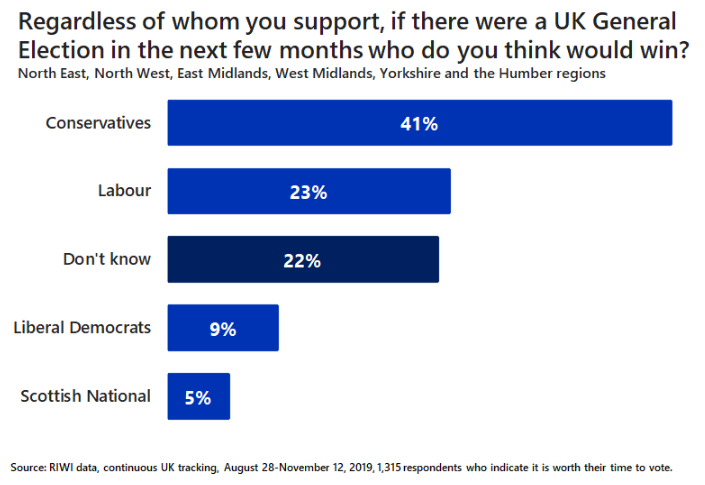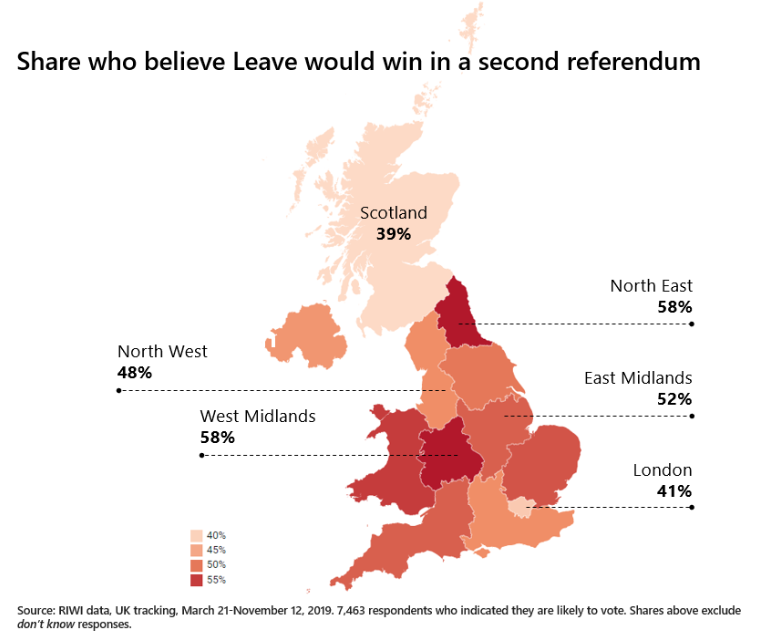By: Emily Kuzan
- UK national opinion polls won’t tell us whether we will get a Tory majority or a hung parliament in the December 12 UK general election. Moreover, conventional polls tend not to include traditionally disengaged populations nor report on undecided voters.
- But the election hinges on regional races; RIWI’s data from 18,000+ Brits – both politically disengaged and engaged – collected continuously every day from March 2019 and continuing until the election captures real-time intentions in the swing regions of North England, the Midlands, and Yorkshire and the Humber.
- A slight majority of likely voters in these regions believe Leave would win in a second referendum, and Conservatives enjoy strong support in these regions, however there is still a significant share of undecided voters that could determine the outcome. RIWI will continue to track this at the county level of detail in advance of the election.

Will the UK leave the EU (virtually guaranteed in the case of a Conservative majority)? Will Brexit be stalled by never-ending delays (possible in the case of a hung Parliament)? Or will a second Brexit referendum be called (also possible in the case of a hung Parliament)?
In the past, pollsters could assume that an X% increase in a party’s overall vote share implies an X% increase in each constituency but this did not apply in the 2017 UK general election, nor is it likely to apply in the upcoming election. To accurately predict the result of the upcoming election, it will be crucial to look deeply at regional differences. Moreover, now party support is strongly influenced by individuals’ stance on Brexit.
RIWI has been continuously tracking Brits’ opinions on Brexit since March 2019, adding questions about a potential general election in August. Unlike traditional polls which sample from a narrow, self-selected, highly engaged group of (mostly paid) respondents, RIWI respondents come from a broad and truly random set of the population, and go far beyond those who typically answer surveys of any kind. Over sixty percent of RIWI daily British respondents report to us that they have not answered a survey in the past month. RIWI does not collect any personally identifiable data and respondents are not incentivized in any way (e.g. with money or rewards), allowing respondents to provide their views freely and securely, reducing social desirability bias. RIWI accurately predicted the lack of youth turnout that proved critical in the 2016 Brexit referendum, President Trump’s 2016 election win and many other recent elections and referenda.
RIWI also asked over 18,000 people between March and November 2019 what they think the result of a second Brexit referendum would be. Asking people what they think the result will be has been more predictive in past elections and referenda than asking people for whom they will personally vote.

Our map highlights opinions of likely voters across the crucial swing regions (North England, the Midlands, and Yorkshire and the Humber). West Midlands and North East have the highest support for leaving the EU, which could prefigure support for the Tories in the upcoming election.
The result of the general election will come down to a handful of contentious constituencies. To predict whether the Conservatives win a majority this December, RIWI is tracking party preference, likelihood to vote, opinion on Brexit, among other indicators in all counties/districts in the UK.
Featured image: J. Hordle/ITV
